|
|
|
Sort Order |
|
|
|
Items / Page
|
|
|
|
|
|
|
| Srl | Item |
| 1 |
ID:
057599
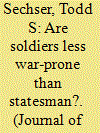

|
|
|
| 2 |
ID:
096693
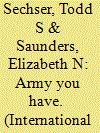

|
|
|
|
|
| Publication |
2010.
|
| Summary/Abstract |
Recent research suggests that a crucial factor in understanding the outcomes of military conflicts is the extent to which militaries are mechanized-that is, their relative dependence on tanks and armored vehicles compared to manpower. Since World War II, militaries have become increasingly mechanized both among the great powers and in unexpected quarters of the developing world. Yet the extent of military mechanization varies widely across states. Why have some states adopted highly mechanized force structures, while others have not? This paper tests several hypotheses about the determinants of military mechanization. One perspective suggests that strategic factors-including the force structures of adversaries and neighbors, recent combat lessons, and internal insurgency threats-shape a military's mix of manpower and vehicles. A second set of hypotheses points instead to domestic institutions such as democracy and civilian control of the military. Still other theories emphasize economic forces and international norms. To test these and other hypotheses, we construct a new data set containing mechanization rates for more than 150 militaries from 1979 to 2001. Broadly, we find significant support for the strategic perspective and little support for domestic institutional explanations. In addition, the results suggest systematic and predictable differences in the ways states structure their militaries in response to security pressures.
|
|
|
|
|
|
|
|
|
|
|
|
|
|
|
|
| 3 |
ID:
117997
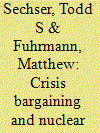

|
|
|
|
|
| Publication |
2013.
|
| Summary/Abstract |
Do nuclear weapons offer coercive advantages in international crisis bargaining? Almost seventy years into the nuclear age, we still lack a complete answer to this question. While scholars have devoted significant attention to questions about nuclear deterrence, we know comparatively little about whether nuclear weapons can help compel states to change their behavior. This study argues that, despite their extraordinary power, nuclear weapons are uniquely poor instruments of compellence. Compellent threats are more likely to be effective under two conditions: first, if a challenger can credibly threaten to seize the item in dispute; and second, if enacting the threat would entail few costs to the challenger. Nuclear weapons, however, meet neither of these conditions. They are neither useful tools of conquest nor low-cost tools of punishment. Using a new dataset of more than 200 militarized compellent threats from 1918 to 2001, we find strong support for our theory: compellent threats from nuclear states are no more likely to succeed, even after accounting for possible selection effects in the data. While nuclear weapons may carry coercive weight as instruments of deterrence, it appears that these effects do not extend to compellence.
|
|
|
|
|
|
|
|
|
|
|
|
|
|
|
|
| 4 |
ID:
167672
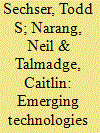

|
|
|
|
|
| Summary/Abstract |
Recent commentary has sounded the alarm about the effects of emerging technologies on strategic stability, yet the topic has received relatively little systematic scholarly attention. Will emerging technologies such as cyber, autonomous weapons, additive manufacturing, hypersonic vehicles, and remote sensing make the world more dangerous? Or is pessimism unwarranted? In this volume, we leverage international relations scholarship, historical data, and a variety of methodological approaches to discern the future implications of new technologies for international security. The findings suggest that new technologies can have multiple, conditional, and even contradictory effects on different aspects of strategic stability, and raise a host of important questions for future research.
|
|
|
|
|
|
|
|
|
|
|
|
|
|
|
|
| 5 |
ID:
099875
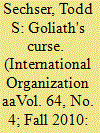

|
|
|
|
|
| Publication |
2010.
|
| Summary/Abstract |
States typically issue compellent threats against considerably weaker adversaries, yet their threats often fail. Why? Expanding on a standard model of international crisis bargaining, I argue that a theory of reputation-building can help shed light on this puzzle. The model casts reputation as a strategic problem, showing that challengers issuing compellent threats have incentives to anticipate the reputation costs that target states incur when appeasing aggressors. If challengers can recognize these costs and offset them with side payments or smaller demands, then even reputation-conscious targets will acquiesce. I argue, however, that military strength contributes to information problems that make challengers more likely to underestimate their targets' reputation costs and insufficiently compensate them. In this way, military power can undermine the effectiveness of compellent threats. The logic is illustrated by the 1939 Russo-Finnish crisis, and the argument's implications for the study of coercive diplomacy are explored.
|
|
|
|
|
|
|
|
|
|
|
|
|
|
|
|
| 6 |
ID:
114188
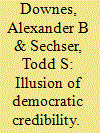

|
|
|
|
|
| Publication |
2012.
|
| Summary/Abstract |
Do democracies make more effective coercive threats? An influential literature in international relations argues that democratic institutions allow leaders to credibly signal their resolve in crises, thereby making their threats more likely to work than threats by nondemocracies. This article revisits the quantitative evidence for this proposition, which we call the "democratic credibility hypothesis," and finds that it is surprisingly weak. Close examination of the data sets most commonly used to test this hypothesis reveals that they contain few successful democratic threats, or indeed threats of any kind. Moreover, these data sets' outcome variables do not properly measure the effectiveness of threats, and therefore yield misleading results. The article then reassesses the democratic credibility hypothesis using the Militarized Compellent Threats data set, a new data set designed specifically to test hypotheses about the effectiveness of coercive threats. The analysis indicates that threats from democracies are no more successful than threats from other states.
|
|
|
|
|
|
|
|
|
|
|
|
|
|
|
|
| 7 |
ID:
157364
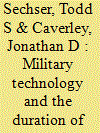

|
|
|
|
|
| Summary/Abstract |
Why do some civil conflicts end quickly, while others last for years? We argue that an incumbent government’s military forces play a crucial role in conflict duration. Specifically, combined arms militaries—which bring to bear a mixture of mechanized infantry, armor, and aircraft—make short conflicts more likely. The use of mechanized ground forces in combination with airpower increases the likelihood of decisive engagements early in a conflict, helping to mitigate information asymmetries that can drive violence. By contrast, less-mechanized forces face greater difficulty bringing the fight to the enemy. Combined arms militaries therefore tend to bring conflicts to more rapid conclusions. However, like maneuver warfare in conventional interstate conflict, these outcomes do not always favor incumbent governments. To test this argument, we employ new, detailed data on military mechanization and airpower from civil conflicts between 1967 and 2003. The results indicate that national militaries with high combined arms capabilities are associated with significantly shorter conflicts. Perhaps surprisingly, this relationship remains robust even when we limit the analysis to insurgencies.
|
|
|
|
|
|
|
|
|
|
|
|
|
|
|
|
| 8 |
ID:
131239
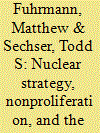

|
|
|
|
|
| Publication |
2014.
|
| Summary/Abstract |
Why do countries deploy nuclear weapons abroad? Since 1945, more than twenty states have hosted foreign nuclear weapons on their territory, and five countries continue to do so today. These deployments have important consequences for international security, yet there is little systematic research about the factors that drive them. In this article, we develop three broad theoretical frameworks to explain why foreign nuclear deployments occur. Using a new data set of foreign nuclear deployments between 1945 and 2000, we find that two factors weigh heavily in driving these deployments: the protection of allies and the projection of military power. Nonproliferation motives, however, appear to play little role. The results carry important implications for our understanding of the causes of proliferation and the sources of nuclear posture.
|
|
|
|
|
|
|
|
|
|
|
|
|
|
|
|
| 9 |
ID:
157900
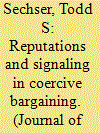

|
|
|
|
|
| Summary/Abstract |
When do states defend their reputations? States sometimes pay high costs to protect their reputations, but other times willingly tarnish them. What accounts for the difference? This article investigates reputation building in the context of coercive diplomacy. In coercive bargaining, giving in to a challenge can harm one’s reputation. I argue, however, that states value their reputations less—and therefore are more willing to capitulate to coercive threats—when they do not expect future challenges. Using a data set of more than 200 coercive threats, empirical tests find support for this logic. Coercers that are constrained in their ability to initiate future challenges exhibit higher rates of coercive success in the status quo. The results shed light on the causes of reputation-building behavior and add an important element to our understanding of the dynamics of coercive diplomacy.
|
|
|
|
|
|
|
|
|
|
|
|
|
|
|
|
| 10 |
ID:
152068
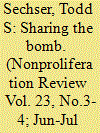

|
|
|
|
|
| Summary/Abstract |
What are the political and strategic consequences of nuclear deployments overseas? The United States continues to maintain around 200 nuclear warheads in Europe, and some observers have called for the United States to redeploy tactical nuclear weapons to the Korean peninsula. This article reviews the insights from recent research on the effects of foreign-deployed nuclear weapons. It asks two central questions. First, does the evidence support the view that foreign nuclear deployments contribute to deterrence? Second, do these deployments strengthen or undermine the Treaty on the Non-Proliferation of Nuclear Weapons? The evidence suggests that foreign nuclear deployments contribute less to deterrence than previously believed. Further, nuclear deployments probably have mixed effects on proliferation. Unanswered questions for further research include the extent to which nuclear-sharing arrangements reassure allies, and the political and strategic consequences of canceling them.
|
|
|
|
|
|
|
|
|
|
|
|
|
|
|
|
|
|
|
|
|